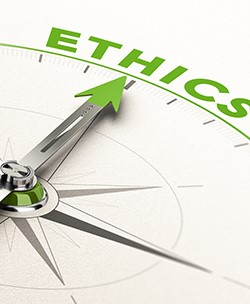Subscribe for Weekly Updates

New Standards for Tax Services: Take Effect in January, Applicable to All CPAs
 By Edward R. Jenkins Jr., CPA, CGMA
By Edward R. Jenkins Jr., CPA, CGMA
Every year, the fall makes me think about my favorite football team, particularly the offense and how often it will “get over the line” for big scores. This year, the AICPA has its own goal-line stand, and this blog highlights the AICPA getting the new Statements on Standards for Tax Services (SSTS) finished and “over the line” to become effective Jan. 1, 2024. I’ve also identified some of the changes in the SSTS, how the SSTS fit into the overall tax ethics infrastructure, and how CPAs can both learn about the SSTS and complete their required ethics CPE hours for the Pennsylvania reporting year.
Heroic doesn’t fully describe the effort of the SSTS Revision Task Force, led by Dave Holets, over the past three-plus years. The task force rewrote the standards, then weeded through countless comments from the AICPA Tax Practice and Responsibilities Committee, the AICPA Tax Executive Committee, state societies, and the general public. The task force finally got the project into the end zone when the AICPA Tax Executive Committee approved the rewritten standards in May 2023. The standards, as revised, will take effect Jan. 1, 2024.
The prior version of the SSTS had seven standards. The revision going into effect boils those seven standards down to four. You can download and review the new standards from the AICPA website. An important roadmap of the changes also is available to download at that same web address. This roadmap significantly contributed to the success of the effort because it clearly indicates which topics were addressed in the former standards and how those topics were incorporated in the revised form.
 The SSTS represent a significant component of the ethics construct that guides CPA practitioners of taxation. In addition to federal statutes and regulations, CPAs in Pennsylvania are bound by the Pennsylvania CPA Act. That act incorporates standards promulgated by standard setting-bodies (such as the AICPA) into the act by reference, giving SSTS and other standards the full effect of law in Pennsylvania. So, the SSTS are not just guidelines; the standards are enforceable in the commonwealth and applicable to anyone practicing as a CPA. The SSTS are enforceable whether or not a CPA-practitioner is a member of the AICPA.
The SSTS represent a significant component of the ethics construct that guides CPA practitioners of taxation. In addition to federal statutes and regulations, CPAs in Pennsylvania are bound by the Pennsylvania CPA Act. That act incorporates standards promulgated by standard setting-bodies (such as the AICPA) into the act by reference, giving SSTS and other standards the full effect of law in Pennsylvania. So, the SSTS are not just guidelines; the standards are enforceable in the commonwealth and applicable to anyone practicing as a CPA. The SSTS are enforceable whether or not a CPA-practitioner is a member of the AICPA.
That ethics construct is one of the topics of an AICPA webinar I am presenting on Oct. 24, 2023. In that webinar, my colleague on the AICPA Tax Practice and Responsibilities Committee, Sarah McGregor, will present the changes to the SSTS, and I will discuss a number of other aspects of the tax ethics construct that apply to CPAs. The webinar will provide up to two credit hours of ethics CPE.
Remember, 2023 is a reporting year for CPAs in Pennsylvania. CPAs in the state must finalize their biennial CPE requirements by Dec. 31 of this year. The PICPA has numerous CPE options available to help you fulfill your credit needs.
Edward R. Jenkins Jr., CPA, CGMA, is the managing member of Jenkins & Co. LLC in Lemont, Pa., and a member of the AICPA Tax Practice and Responsibilities Committee. He can be reached at edwardj@wemanagetaxes.com.
Sign up for PICPA's weekly professional and technical updates by completing this form.
Statements of fact and opinion are the authors’ responsibility alone and do not imply an opinion on the part of the PICPA's officers or members. The information contained herein does not constitute accounting, legal, or professional advice. For actionable advice, you must engage or consult with a qualified professional.







Leave a commentOrder by
Newest on top Oldest on top